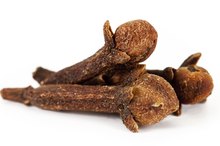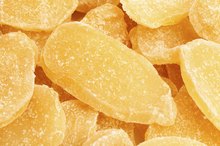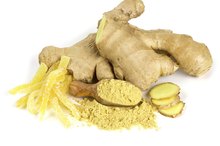What Is Good to Drink to Break-Up Phlegm?
A buildup of phlegm in your throat and lungs can be caused by a number of ailments, such as colds or allergies. Phlegm buildup can leave you coughing constantly, sore in the throat and chest and unable to breath clearly. Luckily there are concoctions you can drink utilizing a number of ingredients which can help to loosen phlegm and thus expel it from your throat, nose and chest.
If you are experiencing serious medical symptoms, seek emergency treatment immediately.
Cayenne Pepper
Cayenne pepper is a popular spice that can help to shake up the phlegm in your throat and clear airways. To make a drink from this spice, boil a cup of hot water and add a half of a teaspoon to it; then stir and sip. If you can’t stomach the bold spicy flavor, add cayenne to your favorite hot tea blend or some beef, chicken or veggie broth to sip on.
Honey
Foods That Act As an Expectorant
Learn More
Honey is another soothing remedy for both sore throats and phlegm overproduction. Like cayenne, honey can be added to hot water and sipped on. You could also mix it with cayenne in hot water to add extra punch to fighting phlegm; or add it to a tea blend. Use raw honey, which contains more health benefits than processed honey brands. Find raw honey at your local grocery or health food store.
- Honey is another soothing remedy for both sore throats and phlegm overproduction.
- Like cayenne, honey can be added to hot water and sipped on.
Ginger
Ginger is a healthful root that can be utilized for phlegm treatment. The added bonus with ginger is that it can also reduce inflammation in the throat, ease upset stomachs, lessen coughs and muscle aches, all of which can be symptoms that accompany phlegm. Mix a teaspoon of powdered ginger with a cup of hot water -- steep a couple of pieces of ginger root in boiling water for 10 minutes -- or mix it with honey and cayenne for triple the phlegm-fighting power.
- Ginger is a healthful root that can be utilized for phlegm treatment.
- The added bonus with ginger is that it can also reduce inflammation in the throat, ease upset stomachs, lessen coughs and muscle aches, all of which can be symptoms that accompany phlegm.
Lemon
Natural Chest Expectorant
Learn More
Lemon is a tangy remedy to help sooth a sore throat while breaking up phlegm. Steep a few slices in a cup of hot water and sip or mix it with one of the aforementioned remedies 1. When utilizing lemon avoid sugary juices or those that contain lemon flavoring and stick with fresh lemon juice. Lemon juice also has vitamin C, which can help your immune system fight off colds.
- Lemon is a tangy remedy to help sooth a sore throat while breaking up phlegm.
Related Articles
References
- Native Remedies: Throat Mucus
- Lillehoj EP, Kato K, Lu W, Kim KC. Cellular and molecular biology of airway mucins. Int Rev Cell Mol Biol. 2013;303:139-202. doi:10.1016/B978-0-12-407697-6.00004-0
- Bills G, Rose C. Principles of Pharmacology for Respiratory Care. Sudbury, MA: Jones & Bartlett Learning; 2019.
- Fahy JV, Dickey BF. Airway mucus function and dysfunction. N Engl J Med. 2010;363(23):2233-47. doi:10.1056/NEJMra0910061
- Seaton A, Leitch G, Seaton D. Crofton and Douglas's Respiratory Diseases. Hoboken, NJ: Wiley; 2008.
- Scaglione F, Petrini O. Mucoactive agents in the therapy of upper respiratory airways infections: fair to describe them just as mucoactive?. Clin Med Insights Ear Nose Throat. 2019;12:1179550618821930. doi:10.1177/1179550618821930
- American Thoracic Society. (2015). What Are the Signs and Symptoms of COPD?
- Centers for Disease Control and Prevention. (n.d.). Runny Nose (with green or yellow mucus).
- Martínez-girón R, Mosquera-martínez J, Martínez-torre S. Black-Pigmented Sputum. J Cytol. 2013;30(4):274-5.
- Nadel, J.A. (2016). Airway Epithelium and Mucous Secretion. Murray and Nadel's Textbook of Respiratory Medicine. 6th ed. 10, 157-167.
- National Health Service. (2015). Coughing up blood (blood in phlegm).
- Rogers, D.F. (2014). Airway Mucus and the Mucociliary System. Middleton's Allergy: Principles and Practice. 47, 739-753
- Rubin, B.K. (2002). Physiology of Airway Mucus Clearance. Respir Care. 47(7), 761-8
- Barnes, P.J., Drazen, J.M., Rennard, S.I. & Thomson, N.C. (2002). Asthma and COPD: Basic Mechanisms and Clinical Management. Academic Press : Elsevier
Writer Bio
Amy Davidson is a graduate from the University of Florida in Gainesville, with a bachelor's degree in journalism. She also writes for local papers around Gainesville doing articles on local events and news.









